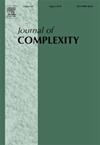迭代随机函数的Rademacher学习率
IF 1.8
2区 数学
Q1 MATHEMATICS
引用次数: 0
摘要
大多数监督式学习方法都假设训练数据是从一个id样本中提取的。然而,现实世界的问题往往表现出时间依赖性和数据生成过程边缘之间的强相关性,使得i.i.d.假设不现实。这种情况自然涉及时间序列过程和马尔可夫链。在这些设置中通常获得的学习率与数据分布无关,可能导致限制性假设类和次优样本复杂性。我们考虑由迭代随机函数生成的训练数据不一定是不可约的或非周期的。假设控制函数在第一个参数上是收缩的,并且在假设类上满足一定的正则性条件,我们首先建立了样本误差的一致收敛性。然后证明了近似经验风险最小化的可学习性,并推导了其学习率界。这两个边界都通过假设类的Rademacher复杂性显式依赖于数据分布,从而更好地捕获数据生成分布的属性。本文章由计算机程序翻译,如有差异,请以英文原文为准。
Rademacher learning rates for iterated random functions
Most supervised learning methods assume training data is drawn from an i.i.d. sample. However, real-world problems often exhibit temporal dependence and strong correlations between marginals of the data-generating process, rendering the i.i.d. assumption unrealistic. Such cases naturally involve time-series processes and Markov chains. The learning rates typically obtained in these settings remain independent of the data distribution, potentially leading to restrictive hypothesis classes and suboptimal sample complexities. We consider training data generated by an iterated random function that need not be irreducible or aperiodic. Assuming the governing function is contractive in its first argument and subject to certain regularity conditions on the hypothesis class, we first establish uniform convergence for the sample error. We then prove learnability of approximate empirical risk minimization and derive its learning rate bound. Both bounds depend explicitly on the data distribution through the Rademacher complexities of the hypothesis class, thereby better capturing properties of the data-generating distribution.
求助全文
通过发布文献求助,成功后即可免费获取论文全文。
去求助
来源期刊

Journal of Complexity
工程技术-计算机:理论方法
CiteScore
3.10
自引率
17.60%
发文量
57
审稿时长
>12 weeks
期刊介绍:
The multidisciplinary Journal of Complexity publishes original research papers that contain substantial mathematical results on complexity as broadly conceived. Outstanding review papers will also be published. In the area of computational complexity, the focus is on complexity over the reals, with the emphasis on lower bounds and optimal algorithms. The Journal of Complexity also publishes articles that provide major new algorithms or make important progress on upper bounds. Other models of computation, such as the Turing machine model, are also of interest. Computational complexity results in a wide variety of areas are solicited.
Areas Include:
• Approximation theory
• Biomedical computing
• Compressed computing and sensing
• Computational finance
• Computational number theory
• Computational stochastics
• Control theory
• Cryptography
• Design of experiments
• Differential equations
• Discrete problems
• Distributed and parallel computation
• High and infinite-dimensional problems
• Information-based complexity
• Inverse and ill-posed problems
• Machine learning
• Markov chain Monte Carlo
• Monte Carlo and quasi-Monte Carlo
• Multivariate integration and approximation
• Noisy data
• Nonlinear and algebraic equations
• Numerical analysis
• Operator equations
• Optimization
• Quantum computing
• Scientific computation
• Tractability of multivariate problems
• Vision and image understanding.
 求助内容:
求助内容: 应助结果提醒方式:
应助结果提醒方式:


